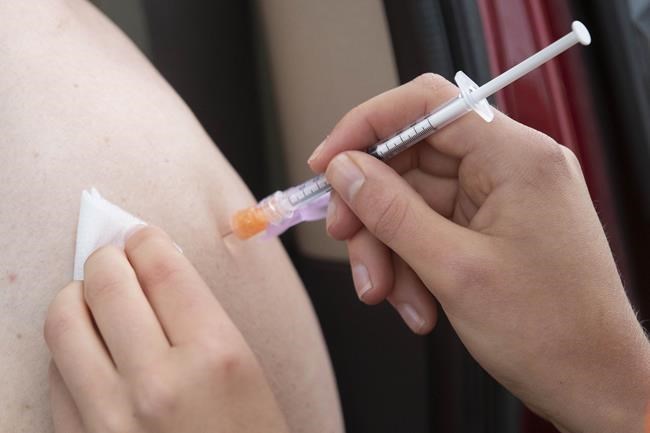TORONTO — Ontario is putting $2.2 billion more toward COVID-19 spending, bracing for the impacts of the Delta variant as the province sees a rising number of cases, largely in unvaccinated people.
The province reported 513 new infections on Thursday, with more than 80 per cent of them in unvaccinated or partially vaccinated people.
It was the highest case total since mid-June and was based on 22,896 tests done in the previous day. Half of the total new cases were in people aged 20 to 39.
No new deaths were reported, and Health Minister Christine Elliott said 113 people were in intensive care units due to COVID-19. Two of them are fully vaccinated, five are partially vaccinated, 44 are unvaccinated, and 62 have unknown vaccine status.
The latest figures came as Finance Minister Peter Bethlenfalvy released the province's 2021-22 first quarter finances Thursday, announcing an additional $2.2 billion for a COVID-19 fund, thanks to a revenue projection that's $2.9 billion higher than in the budget.
"Under normal circumstances and all other factors remaining the same, higher than projected revenue would directly reduce the deficit," he said.
"However, there remains continued uncertainty about variants of concern, the risk of surges and future waves, and the need to target future investments to spur economic recovery."
The higher revenue is due to $1.9 billion from the federal government and another approximately $1 billion from corporate taxes and land transfer taxes.
The deficit projection is being revised by $700 million, down to $32.4 billion.
Bethlenfalvy didn't specify what the $2.2 billion in new COVID-19 spending would go toward, saying it's available for the government to use to protect people's health and the economy as needed.
All three opposition parties said that money should be used now, to make schools safer for children returning to in-person learning in a few weeks, rather than setting it aside for some future use.
The Ontario Medical Association on Thursday called for mandatory vaccinations for teachers and other school staff.
"Children are currently ineligible to receive COVID-19 vaccines and are therefore reliant on others to keep them safe," OMA president Dr. Adam Kassam said in a statement.
Premier Doug Ford has said he will not mandate vaccines for anyone, including teachers and health-care workers, nor will he bring in a vaccine certificate system to access non-essential services, as some other jurisdictions such as Quebec are doing.
Toronto Mayor John Tory applauded a move by the federal government to develop a vaccine passport for international travel, and said Thursday that Ford should now implement a provincial vaccine certification system.
"Based on the advice I am receiving from medical officials, I believe such a provincial plan is the best thing we can do right now to protect these businesses and other places of work from being closed down again due to a surge," he said in a statement.
"A province-wide proof of vaccination system will help encourage more people to get vaccinated and will help us continue our progress reopening and recovering from COVID-19."
Ontario's fiscal recovery will be driven by economic growth, the finance minister said earlier in the day.
Real GDP increased 1.2 per cent in the first quarter of 2021, putting it only 1.8 per cent below the level in the fourth quarter of 2019.
Ontario also hit a vaccination milestone Thursday, with more than 20 million doses now administered.
This report by The Canadian Press was first published Aug. 12, 2021.
Allison Jones, The Canadian Press



